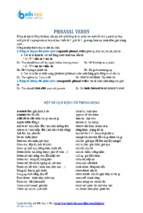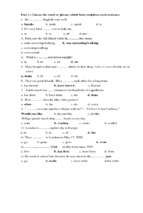PHU THO PEOPLE’S COMMITEE
HUNG VUONG UNIVERSITY
---------&---------
NGUYEN THI DUNG
K6 ENGLISH CLASS
SUMMARY OF GRADUATION PAPER
INVESTIGATING SOME FACTORS AFFECTING
ENGLISH SPEAKING SKILL OF K9 ENGLISH
STUDENTS – FOREIGN LANGUAGE DEPARTMENT –
HUNG VUONG UNIVERSITY AND SUGGESTING
SOME SOLUTIONS.
Field: Linguistics
Code:
Mentor: Nguyen Thi Thu Hang, MA_Foreign
Language Department –Hung Vuong University
Phu Tho, May 2012
ACKNOWLEDGEMENTS
This research has been developing for almost seven months
with the responsibility of researcher and great help from other people.
First of all, I wish to express my deep gratefulness to my
supervisor, Mrs. NguyÔn ThÞ Thu H»ng, MA_Foreign Language
Department –Hung Vuong University. She is the person who has been
my trusted guide through the completion of the thesis.
My acknowledgement is also sent to Dean and Leading Board of
English faculty, who gave me opportunities to study and do my
graduation paper.
My deepest gratitude also goes to all the lectures of English
faculty at Hùng Vương University for their enthusiastic teaching
during my four_ year study. They gave me not only knowledge but
also the precious experience in life.
Great acknowledgement is made to all authors of the books listed
in the biography, whose ideas have inspired and stimulated my thinking
and my writing of this paper.
Many thanks are also sent to my dear friends who have shared
with me a lot during my studies and my research work as well.
Last but not least, the whole- hearted thanks to my parents,
siblings, especially my beloved who have loved, cared and stood by my
side through any joyful and depressing moments in my life.
Phu Tho, May, 2012
Nguyen Thi Dung
ABSTRACT
For some recent years, English plays an important role in Viet nam,
therefore, it had been taught in schools as a compulsory subject. Although
the English teaching curriculum in Vietnam has been changed a lot, it does
not meet the main objective of learning and teaching foreign language in
general which is communicative competence.
As a result, after graduating from university, most of the students can
not communicate well in English although they are very good at grammar
and vocabulary and students in Hung Vuong University are not except. That
is why improving their speaking ability should be paid more attention when
they are still at university. It is also a question inspired me to think about
factors affecting English speaking skill and from that suggest some solutions
to improve students’ speaking skill for k9 English students - Foreign
Language Department- Hung Vuong University.
In attempt to fulfill my thesis, the following processes are made:
Firstly, the theoretical background of speaking skill in English
learning. Then the survey questionnaire is delivered the students to find out
the current situation of learning and teaching as well as some factors
affecting on English speaking skill of the first year English students.
Besides, other method employed includes classroom observations.
From the collected findings, some suggested solutions have been
recommended with aiming at improving students’ speaking skill.
At the end of this study, those activities have applied with the hope to
help k9 English students to learn speaking skill effectively.
Table of content
ACKNOWLEDGEMENT
ABSTRACT
A. INRODUCTION.....................................................................................1
I. Background for the study…………………………………….. 1
II. Research purpose……………………………………………. 2
III. Hypothesis…………………………………………………………… 2
IV. Research procedure………………………………………………….. 3
V. Scope of the study……………………………………………………. 3
VI. The significance of the research……………………………………
3
VII. Organization of the study…………………………………………… 3
B. THE STUDY…………………………………………………………. 6
6
Chapter i: literature
review………………………………………...
1.1. Speaking skills in English learning………………………………….. 6
1.1.1. An overview of speaking skills……………………………………. 6
1.1.2. The importance of speaking skills in English learning……………. 7
1.1.3. Principles for teaching speaking…………………………………..
1.2. Factors affecting learning English speaking skills …………………
8
11
1.2.1. Listening comprehension…………………………………………..
1.2.2. Grammatical accuracy……………………………………………..
1.2.3. Pronunciation………………………………………………………
1.2.4. Vocabulary…………………………………………………………
11
11
12
13
1.2.5 Appropriateness of answers………………………………………... 14
1.2.6. Organization of ideas……………………………………………… 14
1.2.7. Fluency…………………………………………………………….
15
1.2.8. Enthusiasm and Self-confidence………………………………….
16
1.2.9. Length of answers…………………………………………………. 17
1.3. Strategies to speak English well…………………………………….. 17
1.4. Useful activities in learning English speaking………………………
21
CHAPTER II: Methodology…………………………………………… 26
2.1. Subject of the study………………………………………………….. 26
2.2. Data collection instruments…………………………………………. 27
2.2.1. Classroom observation…………………………………………….
27
2.2.1.1. Reasons of classroom observation………………………………. 27
2.2.1.2. Description of classroom observation…………………………… 28
2.2.2. Survey questionnaires……………………………………………... 28
2.2.2.1. Reasons for choosing the questionnaire…………………………. 28
2.2.2.2 Description of survey questionnaire……………………………...
29
2.3. Current situation of learning speaking English……………………… 29
2.3.1. Data collected from observation…………………………………
29
2.3.2. Data collected from students’ survey……………………………… 30
2.4. Results………………………………………………………………. 34
CHAPTER III: Suggested
37
Solutions……………………………………
3.1. Discussion…………………………………………………………… 37
3.2. Picture Describing…………………………………………………
38
3.3. Role-play…………………………………………………………….
39
CHAPTER IV: The
40
Experiment………………………………………….
Procedure…………………………………………………………….
40
CHAPTER V: Results and Discussion………………………………… 45
5.1. Results……………………………………………………………….
45
5.1.1. Results from the test………………………………………………. 45
5.1.2. Results from class observation…………………………………….
46
5.1.3. Results from recording……………………………………………
48
5.2. Discussion…………………………………………………………… 49
Part c:
51
CONCLUSION………………………………………………………..
I. Implications……………………………………………………………
51
II. Limitations of the study……………………………………………… 52
III. Suggestions for further studies………………………………………. 53
References
Appendixes
Hung Vuong University - Foreign Language Department
Part A: introduction
I. Background for the study
All developing nations are aware of the fact that learning a foreign
language is very important in order to adopt the latest scientific and
technological innovations in the world. Undoubtedly, English has become a
world language rather than the language of only the English speaking countries
such as the UK and the US because the number of the people who use English as
a means of communication exceeds much more than the number of the people
who speak it as their mother tongue. Hence, English is used as a common
foreign language to contact the people in other countries, and thousands of
people belonging to various professional groups are going abroad (either with
the support of some institutions or not).
English has become one of the most important languages in the world. It
has trickled even into lesser known countries as something that is needed to
communicate with others. English is used in politics, business dealings, and
everyday life. Many people are finding it hard to get by without knowing
English. The global language of English is found in popular music, television
programs and even on the internet. As a whole, there are more websites made in
English than anywhere. Realizing the importance of English, many people have
taken it on as a second language.
Being able to speak English accurately and fluently is a big desire for
anyone studying English and this seems to be the most challenging task for EFL
learners. This task can be fulfilled if students live up to some basic requirements
and one of them is the English speaking skill and good English speaking skill is
considered as the key to successful communication.
Speaking is a crucial part of second language learning and teaching.
Despite its importance, for many years, teaching speaking has been undervalued
and English language teachers have continued to teach speaking just as a
Nguyen Thi Dung – K6 English
1
Graduation Paper
Hung Vuong University - Foreign Language Department
5 repetition of drills or memorization of dialogues. However, today's world
requires that the goal of teaching speaking should improve students'
communicative skills, because, only in that way, students can express
themselves and learn how to follow the social and cultural rules appropriately in
each communicative circumstance.
There is a fact that k9 English students, they are the first year students
so their ability to speak English is not very good. The reasons mentioned above
have inspired the author of this paper to conduct the study entitled “Investigating
some factors affecting speaking skill of K9 English students of the Foreign
Language Department – Hung Vuong University and suggesting some
solutions”. And hopefully, this study will contribute to the goal of enhancing
students’ performances in learning foreign languages in general and English in
particular.
II. Research purpose
The study aims at the following goals:
Researching on the theoretical background of the issues of English
speaking skill.
Investigating some factors affecting English speaking skill of K9
English students at the Foreign Language Department – Hung Vuong
University.
Suggesting some solutions to improve students’ English speaking
skill.
Conducting experiment to test the effectiveness of the suggested
solutions.
III. Hypothesis
By investigating some factors affecting English speaking skill of
K9 English students at the Foreign Language Department – Hung Vuong
University and suggesting some solutions to improve students’ English speaking
Nguyen Thi Dung – K6 English
2
Graduation Paper
Hung Vuong University - Foreign Language Department
skill, the students’ performances of speaking will be better, more interesting and
their English competence in general will be improved.
IV. Research procedure
The study based on some theoretical background on aspects involving
speaking skill. By theoretical method the researcher reviewed in the literature
review section to get the basis for the research.
Classroom observation and questionnaires were administered to get the
information about situation of learning English speaking at the university. Then
the results collected were analyzed to identify some factors and some feasible
solutions will be provided.
In order to test the effectiveness of suggested solutions, the researcher
carried out an experiment. After the experiment, there were results to help the
researcher make further comments on the procedure.
V. Scope of the study
The study focused on investigating some factors affecting English
speaking skill made by the first year English students at the Foreign Language
Department – Hung Vuong University, working out the causes for these factors
and proposing some solutions to solve the problem.
VI. The significance of the research
This research is carried out with the hope that it can help find out factors
affecting English speaking skill made by the first year English students at
Foreign Language Department – Hung Vuong University. This study is also
beneficial to students themselves because once they have realized their own
factors, they can avoid confusing when communicating. Besides, this research
also lays the foundation for further studies on this topic.
VII. Organization of the study
The study consists of three main parts:
Nguyen Thi Dung – K6 English
3
Graduation Paper
Hung Vuong University - Foreign Language Department
Part A: Introduction.
This chapter introduces an overall view of the research.
Part B: The study: consists of 5 chapters
Chapter I: Literature review
Literature review of English speaking, factors affecting learning English
speaking, strategies to speak English well, and some useful activities in learning
speaking are provided in this chapter.
Chapter II: Methodology
This chapter contains two sections. The first section provides detailed
information about the subjects of the study, and then focuses on some reasons
for choosing the data collections. The second section provides some findings
about the real situation of teaching and learning speaking, some factors affecting
English speaking skill of the first year English students – foreign language
department- Hung Vuong University.
Chapter III: Suggested solutions
The researcher will provide some feasible solutions to improve students’
English speaking skill.
Chapter V: The experiment
The researcher would like to conduct an experiment to help students
improve their speaking skill.
Chapter IV: Results and discussion
The researcher will give the results and discussion after conducting an
experiment.
Part C: Conclusion
This concludes summary, implications, limitations of the research, and provides
suggestions for further studies.
Nguyen Thi Dung – K6 English
4
Graduation Paper
Hung Vuong University - Foreign Language Department
References
Appendix
Nguyen Thi Dung – K6 English
5
Graduation Paper
Hung Vuong University - Foreign Language Department
Part b: the study
Chapter I: literature review
In this chapter, the researcher reviews the literature of speaking skill,
factors affecting learning English speaking, strategies to speak English well and
some useful activities in learning speaking. Those are important factors which
help the researcher resolve problems in the study.
1.1. Speaking skills in English learning
1.1.1. An overview of speaking skills
Speaking is among the four skills which learners take interest in when
learning a language. It is one of the most used skill, and need to be paid much
attention to both foreign teachers and learners.
Speaking is "the process of building and sharing meaning through the use of
verbal and non-verbal symbols, in a variety of contexts” (Chaney, 1998: P 13).
Speaking is a crucial part of second language learning and teaching. Despite its
importance, for many years, teaching speaking has been undervalued and
English language teachers have continued to teach speaking just as a repetition
of drills or memorization of dialogues.
In addition, Brown (1994b) and Burns & Joyce (1997) also share the same
view. They considered speaking as an interaction process of constructing that
involves producing, receiving and processing information. Its form and meaning
are dependent on the content in which it occurs, including the participants
themselves, their collective experiences, the physical environment, and the
purposes for speaking, which is often spontaneous, open-ended, and involving.
However, speech is not always unpredictable. Language functions or language
patterns tend to recur in curtain discourse situations (for example: accepting an
invitation or ordering food and drink) Burns & Joyce, 1997). In other words,
speaking is the activity which helps speakers transfer information and maintain
Nguyen Thi Dung – K6 English
6
Graduation Paper
Hung Vuong University - Foreign Language Department
the relationship. Speaking requires learners to not only learn how to produce
specific points of language such as grammar and vocabulary (linguistic
competence), but also when, why and in what ways language is produced
(linguistic competence).
Although the concept of “speaking skill” was mentioned a lot, it seems to
be too difficult to give an exact definition. Among which Mackey (cited in
Bygate, 2000) summarized oral expressions as follows:
Oral expression involves not only the use of the right sounds in the right
patterns of rhythm and intonation but also the choice of words and inflections in
the right order to convey the right meaning.
In another research, Brown and Yule (cited in Richard, 1983) have
pointed out the functions of speaking which are classified into two main
functions known as international functions of speaking and the transactional
functions.
1.1.2. The importance of speaking skills in English learning
Speaking, along with other three skills including reading, listening and
writing helps learners learn a language most effective. Good speaking skills help
people communicate the fastest and the most effective. Therefore, “some sort of
dynamic individual and meaningful oral practice should be included in English
lessons right from the beginning” (Hypel & Richard 198:13). There are the
reasons why speaking skill is important.
According to Flohr and Paesler (2006), speaking skills are the most
important ones in learning a foreign language, they also emphasized that “the
focus in learning a foreign language is on communication activities and
expressive abilities and the global is to become a fluent speaker”
Some others considered speaking as a meaningful source of motivation.
According to Lawtiew, ELT teacher of British Council:
Nguyen Thi Dung – K6 English
7
Graduation Paper
Hung Vuong University - Foreign Language Department
If students do not learn how to speak or do not get any opportunity to speak in
the language classroom they may soon get de-motivated and lose interests in
learning. On the hand, if the right activities are taught in the right way, speaking
is in the class can be a lot of fun and dynamic place to be. (2002)
According to As Hornby (2010, P.129):
Speaking helps us express or communicate opinions, feelings, ideas, etc,
by or as talking and it involves the activities in the part of the speaker as
psychological, physiological and physical stage. Teaching speaking skill makes
lessons more interesting. Teaching speaking skill brings about a distinguished
classroom atmosphere. It attracts all learners’ interests. Moreover, it urges them
to be more active in the classroom activities, and it makes the lesson more
interesting.
Moreover, when discussing on the approach to teaching speaking, it was
cited in Bygate (2000) that “Approaches to the teaching of speaking in a foreign
language reflect the understanding of at least two phenomena: the nature of
speaking in a second language, and how people learn”
To sum up, speaking is really important in English teaching and learning.
First of all, it is not only a helpful teaching medium for teacher to motivate and
interest students in learning English, but also a catalyst to impose them in other
skills and make them better communicators. Moreover, speaking is a significant
pass in students’ learning since it is considered an instrument to measure
students’ knowledge and ability of using English naturally and fluently in daily
life.
In general, speaking serves as an indispensable skill of any learners in
learning a foreign language.
1.1.3. Principles for teaching speaking.
According to Nunan (2003) teaching speaking is described as the
followings:
Nguyen Thi Dung – K6 English
8
Graduation Paper
Hung Vuong University - Foreign Language Department
Produce the English speech sounds and sound patterns
Use word and sentence stress, intonation patterns and the rhythm of the second
language.
Select appropriate words and sentences according to the proper social setting,
audience, situation and subject matter.
Organize their thoughts in a meaningful and logical sequence.
Use language as a means of expressing values and judgments.
• Use the language quickly and confidently with few unnatural pauses, which are
called as fluency.
One of assessments of their learners’ learning progress particularly
is the levels of speaking effectively. Such a case rushes linguistics and teachers
to get suggest some principles for teaching speaking.
In the book “Focus on speaking” published in 1997, Burns and Joyce
showed six following principles:
• “Learners need to understand the cultural and social purposes of spoken
interaction, which maybe classified broadly as transactional or internal.
• Speaking in evolves an understanding that spoken texts differ from written
texts in their grammatical construction and discourse strategies.
• Speaking activities should focus on whole texts in context rather than in the
sentence level grammatical constructions in isolation.
• Speaking involves an understanding of the ways in which context influences
the choices of language made.
• Learning and practicing vocabulary, grammatical structures and pronunciation
should be related to context and lead to the use of the whole texts.
• Spoken discourse types or texts can be analyzed with learners for their typical
structures and grammatical patterns”
(Burns and Joyce, 1997)
Nguyen Thi Dung – K6 English
9
Graduation Paper
Hung Vuong University - Foreign Language Department
In Burns and Joyce’s viewpoint, the principles of teaching speaking relate
to the cultural and social purposes of spoken interaction, understanding of the
differences spoken and written texts, understanding of context influencing the
choices of language, and so on. Obviously, Burns and Joyce are very interested
in the learner’s understanding of purposes and context of spoken
communication.
Similarly, Forseth takes care of principles of teaching. He however, pays
attention to more details as the followings:
• “Limit the objectives to avoid to overwhelming the students by providing
them with enough structures practice.
• Mix the speaking activities with comprehensive work.
• provide activities, which involve dialogues and functional use of language.
• Do not emphasize the significance of mistakes.
• State and work toward real and spontaneous speech.
• Design activities, which encourage natural interaction between speakers.
• Place students in pairs, or small groups
• Provide topics of interest to the students: interesting topics increase students’
motivation.
• Use the target language. This greatly increases the amount of English spoken
and reduces the temptations of students to hide in their native language”.
(Forseth, 1955)
Thus, Burns, Joyce and Forseth presented some principles of teaching
speaking in which teachers need to pay attention to the purposes of
communication, culture aspects, and functional language design. In addition,
teacher should take consider to how to organize and lead a lesson interestingly
and effectively. In order to reach above purposes, teachers’ knowledge and skills
in material adaptation as well as teachers’ classroom management are necessary
to be taken into account.
Nguyen Thi Dung – K6 English
10
Graduation Paper
Hung Vuong University - Foreign Language Department
1.2. Factors affecting learning English speaking skills
How does one acquire good English speaking skills? A lot of people aim
to have an American or British accent in order to impress other people, and for
others to say that they are indeed good in English. However, is this really the
true measure of being a good English speaker? Kenworthy (1987) observed that
there are many factors affecting English speaking skills.
1.2.1. Listening comprehension.
In Kenworthy’s opinion, listening comprehension is a very basic skill
one must have in order to be a good English speaker. Why? One of the most
common and critical mistakes non-native speakers of English make is focusing
their time and effort in improving their English speaking skills without first
assessing and practicing their English listening comprehension skills. A lot of
them actually know grammar rules pretty well and can construct even complex
sentences. Surprisingly, just when you thought they can communicate well in
English, they suddenly come to a halt when being asked questions.
He affirmed that: Some non-native speakers cannot understand the
question/s, because the one asking speaks too fast or because of the speaker’s
accent (in case of an Australian or a British speaker for example). They would
often ask the speaker to repeat the question several times or request the speaker
to speak more slowly, before they finally understand the question. Some, on the
other hand, answer the question/s impressively (with not many mistakes in
grammar and pronunciation; good explanations and examples; amazing fluency)
just to find out in the end that he or she misunderstood the question, and
therefore gave an inappropriate answer.
1.2.2. Grammatical accuracy.
According Kenworthy (1987), some people wondered why there is a
need to have grammatical accuracy in English, when even some native English
speakers commit grammatical mistakes themselves. I used to ask that myself
too, but as I listened more carefully to how both (native English speakers and
Nguyen Thi Dung – K6 English
11
Graduation Paper
Hung Vuong University - Foreign Language Department
non-native English speakers) express their thoughts, the reason dawned on me.
Native English speakers can say what they want without much difficulty due to
their familiarity of the language. If they have difficulty expressing a certain
concept/thought in a certain way, they can just use other ways of saying those
things. They may commit some mistakes in grammar, but the mistakes do not
distort or change the meaning of the sentences they want to convey, thus, it
doesn’t give the listener much of a problem understanding them. On the other
hand, the mistakes many non-native speakers of English commit are those that
often change the meaning of sentences they want to express, and thus create a
misunderstanding. That’s exactly the reason why non-native speakers have to
study grammar more than native speakers.
He also showed the common mistakes in grammar
• Adjectives
Ex. She is the most fairest girl I have ever seen.
(“Fairest” is already in the superlative degree of comparison, so using “most”
before it makes the meaning redundant.)
Ex. He is worst than my ex-husband.
(If only two things/people are being compared, “worse” should be used instead
of “worst”.)
• Verbs
Ex. Few is expected to fail the test.
(The indefinite pronouns both, many, several and few take a plural verb.)
Ex. They hanged the old fiddle in the woodshed.
(Some are confused with hanged and hung. “Hanged” means to kill somebody
or yourself by fastening a rope around the neck and removing any other support
for the body. “Hung”, on the other hand, means to suspend or fasten something
so that it is held up from above. In this sentence, it seems as if the old fiddle was
killed, which of course doesn’t make any sense.)
1.2.3. Pronunciation
Nguyen Thi Dung – K6 English
12
Graduation Paper
Hung Vuong University - Foreign Language Department
Unlike other languages, English is not phonetic. What does that mean? It
means we don’t always say English words the way we spell them. Let’s compare
two languages as an example
Ex. The Japanese word “honto” (really) is pronounced the way it is
spelled.
The English word “really” is not pronounced as "re-a-li" or "re-a-lai", nor is the
word “really” spelled as “rili”.
That’s one of the main reasons non-native speakers of English get
confused in pronouncing many English words, especially if their native tongue
is phonetic.
The Sounds of –ed.
The past simple tense and past participle of all regular English verbs ends
in “ed”. However, the “ed” added to the verbs may have different sounds which
depends if the base verb’s sound is voiceless or voiced.
What is the difference between voiced and voiceless sounds?
VOICED -A consonant is voiced when it makes the vocal cords vibrate.
VOICELESS -When a consonant is pronounced without vibrating the vocal
cords,
it’s voiceless.
1.2.4. Vocabulary
Chaney & Burk (1998) observed that: we have already neutralized our
accent. So does that mean we can already convey our messages clearly? We still
need to work on our vocabulary. Many people are misunderstood because of
using words or expressions inappropriately. Below are some examples of the
most commonly misused words in the English language. I hope you’ll find them
helpful.
“Accept” versus “Except”
Accept is a verb which means “to receive”.
Ex. I accept your proposal.
Nguyen Thi Dung – K6 English
13
Graduation Paper
- Xem thêm -





















